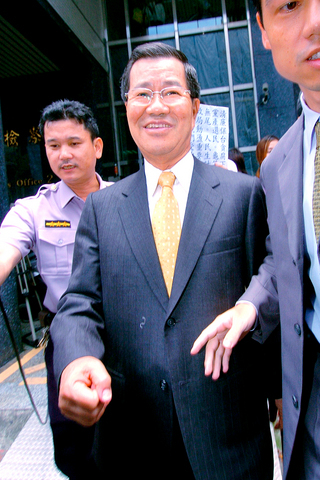Former premier Vincent Siew (蕭萬長) was questioned yesterday as a witness over the kickback and murder scandal involving Taiwan's 1991 purchase of Lafayette-class frigates.
Siew issued a statement after the questioning stating that in 1990, as the then-minister of economic affairs, he had been invited to visit France. During the trip, Siew said, French officials expressed serious concern over a growing trade deficit between the two countries. Siew then suggested that France could narrow the deficit by agreeing to sell fighter jets and warships to Taiwan.
"Then-premier Hau Pei-tsun (

PHOTO: LO PEI-DER, TAIPEI TIMES
The government's original plan in 1988 was to purchase South Korean-made frigates, but it decided in 1990 to purchase the French-made Lafayette frigates instead.
Prosecutors are attempting to determine why the government changed its mind over the warship procurement.
A special prosecutorial panel investigating the high-profile scandal earlier this month subpoenaed former deputy chief of the general staff Hsia Tien (
Hsia, who accompanied Hau on a trip to France in 1989, filed a cable during their France visit on Hau's orders asking the navy to suspend the plan to procure the South Korean-made frigates.
The cable is believed to detail the government's about-face on the frigate procurement.
The subpoena of Siew and Hsia paved the way for Hau's questioning.
The special prosecutorial panel said it would summon Hau for questioning this week.
Prosecutors may subpoena other former policymakers involved in the Lafayette-class frigate procurement, including former president Lee Teng-hui (李登輝).
Lee has previously said that he was not involved in the decision-making process over the warship procurement, and that he did not have the power to interfere with military affairs.
Lee assumed office in 1988, after former president Chiang Ching-kuo (
The special prosecutorial panel has scrutinized a large number of Swiss court files believed to be related to the kickback scandal.
They include information about 46 bank accounts in the name of Andrew Wang (
The files also include details on a number of previously unexposed overseas bank accounts related to the US$2.8 billion Lafayette deal, as well as information about account transactions.
Andrew Wang fled the country following the death of naval Captain Yin Ching-feng (

AIR SUPPORT: The Ministry of National Defense thanked the US for the delivery, adding that it was an indicator of the White House’s commitment to the Taiwan Relations Act Deputy Minister of National Defense Po Horng-huei (柏鴻輝) and Representative to the US Alexander Yui on Friday attended a delivery ceremony for the first of Taiwan’s long-awaited 66 F-16C/D Block 70 jets at a Lockheed Martin Corp factory in Greenville, South Carolina. “We are so proud to be the global home of the F-16 and to support Taiwan’s air defense capabilities,” US Representative William Timmons wrote on X, alongside a photograph of Taiwanese and US officials at the event. The F-16C/D Block 70 jets Taiwan ordered have the same capabilities as aircraft that had been upgraded to F-16Vs. The batch of Lockheed Martin

GRIDLOCK: The National Fire Agency’s Special Search and Rescue team is on standby to travel to the countries to help out with the rescue effort A powerful earthquake rocked Myanmar and neighboring Thailand yesterday, killing at least three people in Bangkok and burying dozens when a high-rise building under construction collapsed. Footage shared on social media from Myanmar’s second-largest city showed widespread destruction, raising fears that many were trapped under the rubble or killed. The magnitude 7.7 earthquake, with an epicenter near Mandalay in Myanmar, struck at midday and was followed by a strong magnitude 6.4 aftershock. The extent of death, injury and destruction — especially in Myanmar, which is embroiled in a civil war and where information is tightly controlled at the best of times —

Taiwan was ranked the fourth-safest country in the world with a score of 82.9, trailing only Andorra, the United Arab Emirates and Qatar in Numbeo’s Safety Index by Country report. Taiwan’s score improved by 0.1 points compared with last year’s mid-year report, which had Taiwan fourth with a score of 82.8. However, both scores were lower than in last year’s first review, when Taiwan scored 83.3, and are a long way from when Taiwan was named the second-safest country in the world in 2021, scoring 84.8. Taiwan ranked higher than Singapore in ninth with a score of 77.4 and Japan in 10th with

China's military today said it began joint army, navy and rocket force exercises around Taiwan to "serve as a stern warning and powerful deterrent against Taiwanese independence," calling President William Lai (賴清德) a "parasite." The exercises come after Lai called Beijing a "foreign hostile force" last month. More than 10 Chinese military ships approached close to Taiwan's 24 nautical mile (44.4km) contiguous zone this morning and Taiwan sent its own warships to respond, two senior Taiwanese officials said. Taiwan has not yet detected any live fire by the Chinese military so far, one of the officials said. The drills took place after US Secretary